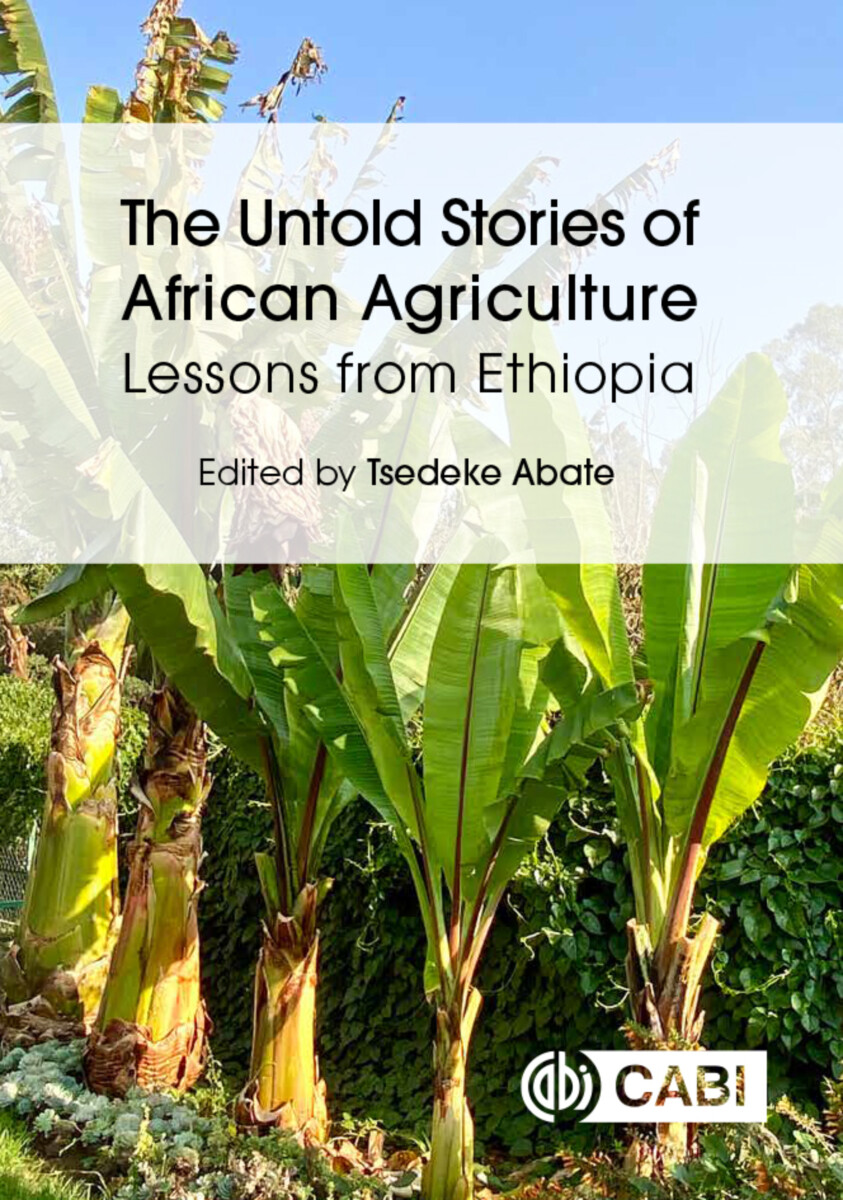The Untold Stories of African Agriculture
Lessons from Ethiopia
- Publisher
CABI - Published
31st July 2024 - ISBN 9781800626362
- Language English
- Pages 384 pp.
- Size 6" x 9"
This landmark volume presents the results of a comprehensive and coherent in-depth assessment of Ethiopian agriculture and draws lessons from it to generate actionable recommendations that will inform policy decisions and priority setting for agricultural transformation across Africa.
Policy makers in Africa are faced with the challenges of ensuring food and nutrition security and the economic wellbeing of their rapidly growing populations while at the same time maintaining the integrity of their natural resource base. Between 2000 and 2021, 74% of the growth in overall crop production on the continent was derived from increases in land area expansion, while increases in yield contributed only 26% of the growth. This unchecked expansion of land use puts the sustainability of the natural resource base under severe pressure.
Even though some countries have made substantial increases in their farm productivity over the last two decades, the overall performance for Africa is far behind other regions. For the most part, in Africa, agriculture is not fulfilling its expected functions of food and nutrition security, increased export earnings, import substitution, and raw material supply for local industries.
Attempts have been made to transform African agriculture over the years, but few countries have succeeded in achieving sustainable change. Using examples from Ethiopia this book identifies the major factors for success and the root causes of underperformance, and offers evidence-based recommendations for future decision making, policy change and the creation of growth. This book:
- Draws on a unique set of case studies from Ethiopia described and told from a truly African perspective.
- Emphasizes to policy makers in Africa that development cannot be outsourced and there are no shortcuts; it is only through consistent effort and sustained support for their agricultural research and development that positive change can be brought about.
- States that past agricultural development efforts by the international community have not properly included a strong African voice, and that therefore, all future academic research, policies and strategies dealing with the continent's agriculture and food security should be formulated by Africa's own leading thinkers and experts.
- Is not a polemic; its arguments are knowledge and evidence based, building a compelling picture of how agricultural development can be sustained for the future.
Background
1. Critical Issues in African Agriculture: A Synthesis Report--Tsedeke Abate
2. The Agricultural Resource Base--Tsedeke Abate, Regassa Feyissa and Kindie Tesfaye
Measuring Productivity Gains in Crops
3. Factors that Transformed Cereals Productivity--Tsedeke Abate, Abebe Menkir, Getachew Belay, Regassa Feyissa, Tolera Keno and Olubunmi A. Bossey
4. A Compelling Case for Increased Investment in Enset and other Root and Tuber Crops R&D--Tsedeke Abate, Berga Lemaga, Terefe Belehu and Zerihun Yemataw
5. Increased Productivity and Socio-Economic Benefits of Grain Legumes--Tsedeke Abate, Girma Tesfahun Kassie, Seid Ahmed Kemal and Asnake Fikre
6. The Rise of Oilseeds in Export Diversification and Earnings
7. The Rise and Decline of Vegetables in Export Diversification and Earnings--Tsedeke Abate
8. The Place of Fruit Crops in Improved Nutrition and Trade--Tsedeke Abate and Asmare Dagnew
9. Spices for Export Diversification--Tsedeke Abate
10. Coffee and Other Plantation and Industrial Crops: Opportunities for Enhancing Productivity and Unlocking their Full Potential--Tsedeke Abate, Ashenafi Ayano and Mikael Fisseha Yohannes
11. Towards Realizing the Potential of Apiculture for Honey Production and Crop Pollination--Tsedeke Abate and Workneh Ayalew
Role of Modern Science in Enhancing Agricultural Productivity
12. What Modern Science Can Offer to Accelerate Sustained Agricultural Productivity: The Role of Biotechnology--Tsedeke Abate and Endashaw Bekele
Crop Protection
13. Protecting the Ethiopian Flora from the Ravages of Arthropod Pests--Gashawbeza Ayalew, Tsedeke Abate, Ferdu Azerefegne, Melaku Wale and Muluken Goftishu
14. Priorities for Plant Pathology Research and Development--Tsedeke Abate
15. Economically Important Weeds and their Management--Taye Tessema, Wondimagegnehu Mersie, Firehun Yirefu, Takele Negewo, Amare Fufa and Tsedeke Abate
Agricultural Inputs
16. The Emerging Seed Systems--Tsedeke Abate, Karta Karke Kalsa, Amsalu Ayana, Melaku Admasu and Maru Degefa
17. Ethiopia Has Yet to Meet the AU Fertilizer Recommendation--Tsedeke Abate and Endeshaw Habte
18. Agricultural Pesticide Use: Current Status and Critical Issues--Tsedeke Abate
19. Status and Insights into the Future of Agricultural Mechanization--Friew Kelemu, Tsedeke Abate and Mikael Fisseha Yohannes
Climate Change and Irrigation Water
20. A Call for Increased Investment in Climate Change--Rahwa Kidane
21. Improved Water Use and Management for Enhanced Agricultural Productivity--Daneal Fekersillassie, Mesfin Shenkut, Engida Zemedagegnehu, Minyahel Fekadu, Tsedeke Abate and Messele Fisseha
Outreach
22. Innovations in Agricultural Technology Transfer: Actors and Legacies--Tsedeke Abate and Endeshaw Habte
23. Agri-Curriculum: The Foundational Role of Indigenous Knowledge in Early Childhood Education
and Beyond--Hawani Negussie and Tsedeke Abate
Socio-Economic Benefits of Investment in AR&D
24. The Changing Food Balance Sheet: What are the Policy Implications? --Tsedeke Abate, Workneh Ayalew, Mintewab Bezabih, Mulat Demeke, Girma Tesfahun Kassie, Amare Tegbaru and Konjit Hailu
25. Agricultural Commodity Trade: What are the Major Issues? --Tsedeke Abate, Mikael Fisseha Yohannes and Dessie Ambaw
Tsedeke Abate
Tsedeke Abate has more than four decades of experience as a leader and researcher at international, regional, and national levels. He is the founder and leader of HGV (Homegrown Vision), an independent think-tank on African agriculture. He led the Drought Tolerant Maize for Africa project and CIMMYT's Maize Seed Systems in Africa between April 2012 and July 2017. Between February 2008 and March 2012, Tsedeke led the Tropical Legumes II project of ICRISAT which was implemented across Africa and Southern Asia. He was Director General of the Ethiopian Institute of Agricultural Research, where he introduced transformational changes, between December 2003 and March 2007.


